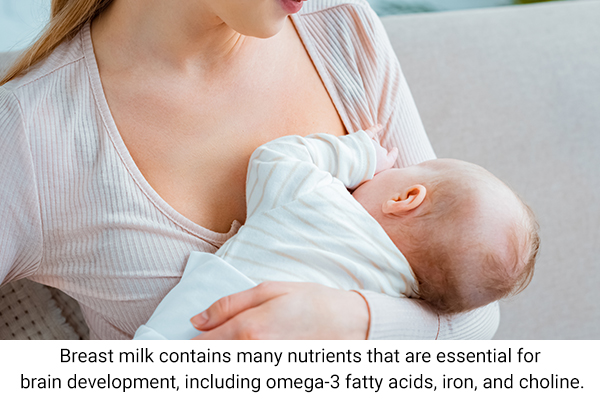In this article:
Breastfeeding has many benefits, including reduced risk of ear infections, pneumonia, and diarrhea. But there’s still one benefit that most parents don’t know about: Breastfeeding may lower the risk of developing mental health problems during childhood.

What Does Breast Milk Contain?
The composition of breast milk is perfectly designed to support a baby’s brain development. Breast milk contains high levels of omega-3 fatty acids, which are essential for building brain tissue. In addition, breast milk is also rich in other nutrients that are important for cognitive development such as iron and zinc. (1)
Some studies have shown that babies who are exclusively breastfed have higher IQ scores than those who are not. While it is not clear exactly how much of an impact breast milk has on IQ, there is no doubt it plays a role in supporting healthy brain development. (2)
In addition to supplying important nutrients, breast milk also provides immunity-boosting antibodies that can help protect babies from illnesses that can interfere with brain development. (3)
What Are the Facts About Breastfeeding and Intelligence?
In a recent study, researchers found that children who were breastfed had higher IQ scores than those who were not, even after 14 years. The study included over 8,000 children in the United Kingdom, and the researchers controlled for factors such as socioeconomic status and parental education. (4)
Other studies found similar results. For instance, a large meta-analysis of over 50 studies found that breastfed infants had slightly higher IQ scores than formula-fed infants. (5)
So what might be the explanation? One possibility is that breastfeeding provides essential nutrients that promote brain development. Another possibility is that the act of breastfeeding itself has an impact on brain development, perhaps through promoting bonding and attachment between the mother and child. (2)
It’s important to note that IQ is not the only measure of intelligence, and many other important factors contribute to a child’s success in life. However, if you’re looking for one more reason to breastfeed your child, the research suggests that it may help them develop into smarter adults. (6)
Breastfeeding and IQ: The Latest Research

A study that included over 17,000 children, the largest randomized-controlled trial until 2008, showed that breastfed children were ahead by 7.5 points for verbal IQ, 2.9 points for performance IQ, and +5.9 for full-scale IQ. (6)
A new study has comprehensively shown that breastfeeding may have a positive effect on children’s IQ. The study, which was published in the journal Pediatrics, followed more than 1,300 children from birth to age 6. The researchers found that those who were breastfed had higher IQ scores at age 6 than those who were not. (7)
The study’s lead author, Dr. Mandy Belfort, said that the findings suggest that “breastfeeding may be one of many factors that contribute to cognitive development.” She added that further research is needed to confirm the findings and to determine whether the effects of breastfeeding persist into adolescence and adulthood.
Despite the promising findings, it’s important to keep in mind that many other factors can affect IQ, including genes, parenting style, and socioeconomic status. So while breastfeeding may have a positive effect on IQ, it’s just one piece of the puzzle. (7)
Other studies have found even larger effects. A meta-analysis of 17 studies found that the IQ scores of breastfed children were, on average, 3.4 points higher than those who were not breastfed. (8)
The mechanism by which breastfeeding may confer these benefits is not fully understood, but it is thought to be due to the beneficial effects of breast milk on brain development. Breast milk contains many nutrients that are essential for brain development, including omega-3 fatty acids, iron, and choline. (1)
Final Word
Several studies have identified a correlation between breastfeeding and IQ. However, it’s important to remember that this is just a correlation and not a cause-and-effect relationship.
Many other factors can affect a child’s IQ, such as their genes, their environment, and their experiences. (4) So while breastfeeding may play a role in increasing children’s IQ, it’s certainly not the only factor.
- Was this article helpful?
- YES, THANKS!NOT REALLY


